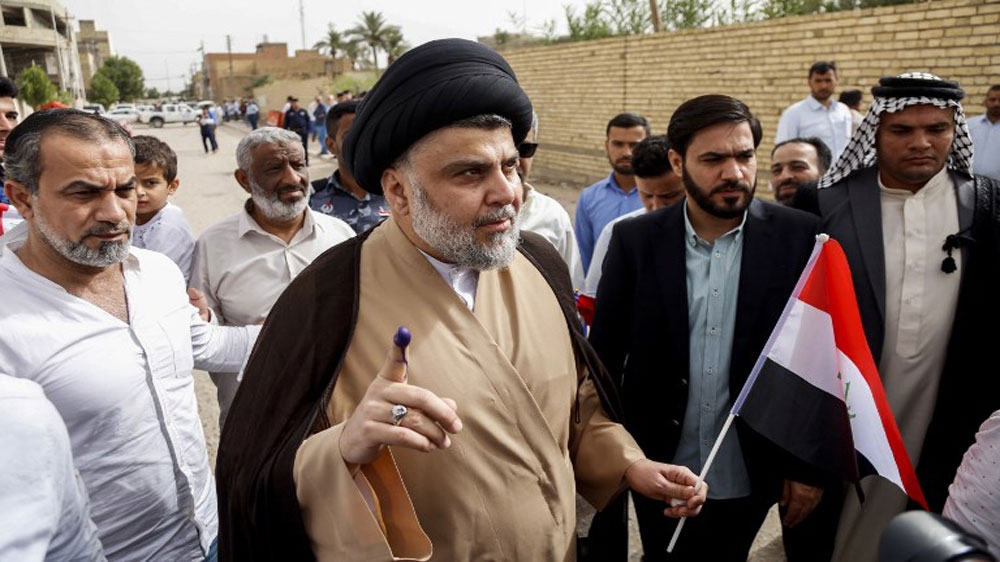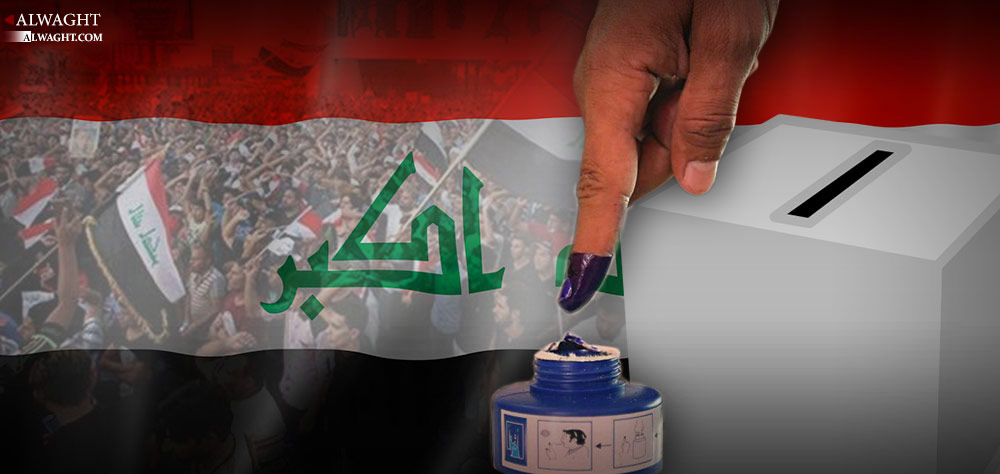Alwaght- Iraq held its parliamentary election on Saturday, the first vote since the ISIS terrorist group defeat in the West Asian country. Eighty-eight political coalitions and factions contested for the 328 seats of the Council of Representatives.
The Independent High Electoral Commission (IHEC), the body responsible for organizing the election, has said that 24.5 million Iraqis registered to vote. When the polls closed, the IHEC reported that 44.52 percent of the eligible voters turned out to cast their ballots. The electoral body predicted that it could issue the final results some 48 hours after the election process.
Partial results have shown that Saeroon Coalition, cleric Moqtada al-Sadr's alliance, is in the lead of Iraq’s parliamentary elections.

Moqtada al-Sadr
According to Iraqi electoral commission on early Monday, Saeroon with communists is closely followed by the Conquest Alliance led by former Popular Mobilization Forces' commander Hadi al-Ameri.
Iraqi Prime Minister Haider al-Abadi's Conquest Alliance is in third place.
The announced results are from 10 of the country's 19 provinces, including the capital Baghdad and Basra.
The initial outcome also suggests that among the Kurdish parties the Kurdistan Democratic Party (KDP) is leading. And the Al-Wataniyah Coalition is a pioneer among Sunni factions of the country.
Turnout report in the 18 provinces
In the May 12 elections, what was very conspicuous was the relatively low turnout rate of the Iraqi citizens.
The country held its parliamentary election first time since large tracts of territory were seized by ISIS in 2014. The army announced defeat of the terrorist organization in 2017, when all cities and towns were cleansed of terrorists.
There is a notion that the political and security shocks the Iraqis were exposed to over the past four years have majorly cut their will to go to the polls.
Meanwhile, the Erbil and Dahuk provinces in the autonomous Kurdistan region in the north of the state set the highest record of voting with a 65 percent turnout. And the lowest turnout rate, 23 percent, was recorded for Maysan province in the country’s southeast. The experts say that 65 percent turnout for the three provinces of Dahuk, Erbil, and Sulaymaniyah, three of which accounting for a major territory of the federal Kurdish government in the north, is an acceptable level. Here is a picture of the elections in figures:
|
Province |
Eligible Voters |
Voted People |
Turnout (Percent) |
|
Baghdad |
5480661 |
19182231 |
34 |
|
Anbar |
1027474 |
246594 |
24 |
|
Wasit |
807055 |
201764 |
25 |
|
Najaf |
985877 |
246469 |
24 |
|
Maysan |
711585 |
163665 |
23 |
|
Muthanna |
489763 |
137134 |
28 |
|
Karbala |
721416 |
187568 |
25 |
|
Al-Qadisiyyah |
754425 |
226328 |
30 |
|
Salahhadin |
7679222 |
191980 |
24 |
|
Dhi Qar |
1253036 |
325789 |
25 |
|
Diyala |
1010445 |
454700 |
44 |
|
Babil |
1193512 |
334183 |
27 |
|
Nineveh |
1602660 |
480798 |
30 |
|
Basra |
1786330 |
589489 |
33 |
|
Erbil |
1194592 |
776485 |
65 |
|
Sulaymaniyah |
1389000 |
763950 |
55 |
|
Dahuk |
718000 |
466700 |
65 |
|
Kirkuk |
878391 |
395276 |
45 |
Total Turnout: 44:52 Percent
Kurdistan constituencies’ fraud allegations
One of the sidelines of the Saturday vote is the claims of fraud through the electronic voting system. The Kurdish region saw the largest allegations of manipulation of the votes. The Gorran (Change) Movement, Kurdistan Islamic Group, Kurdistan Islamic Union, the New Generation Movement, and the Coalition for Democracy and Justice, that make up the body of the Kurdish region’s opposition, have refused to recognize the initial results, asserting that they will not approve of them under no conditions. Their main protest targeted the polls outcome in Sulaymaniyah province, where the Patriotic Union of Kurdistan harvested the largest number of the votes. As the protestation heated up, Darbaz Mohammad, the Iraqi minister for migration and refugees affairs, has talked of dispatching three supervisory delegations to the Kurdistan region to conduct a probe into fraud claims and results rejection. The delegations, he added, are meant to see into the votes and the complaints of various parties that cast doubt on the health of the electoral process.
The opening of the investigation comes while Riad Badran, the head of the Electoral Commission, on early Sunday in a press conference congratulated the whole Iraqis for “successful” holding of the parliamentary elections. He continued that from the total 24.5 million eligible citizens nearly 10.7 million cast their ballots in the fourth parliamentary election, recording a 44.52 percent turnout level. The IHEC’s head made assurances to the Iraqi citizens about the health of the voting process, suggesting that the allegations of manipulations and election cheat are “devoid of reality.” He held that some of the factions are trying to destabilize the situation and confuse the public. Badran called on all of the sides to respect the election result and deal with it according to the law.



























